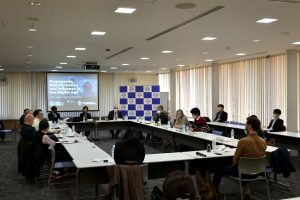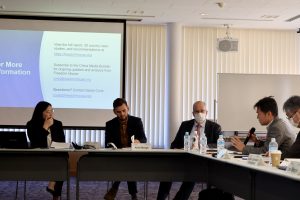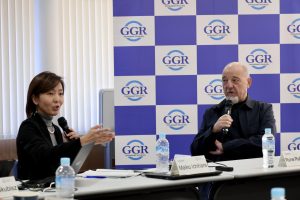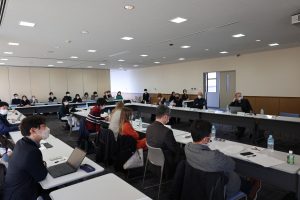On December 3, 2022, the Institute for Global Governance Research (GGR) and the Norwegian Defence Research Establishment (FFI) hosted an international conference “Propaganda, Disinformation and Influence in the Digital Age: Global Reach, Regional Challenges,” where distinguished researchers in the field of influence operations research gathered from around the world to present and discuss their latest research findings on disinformation and its influence.
- Introduction: Norway and Japan research
The session was conducted by Maiko Ichihara (Hitotsubashi University) and Arild Bergh (FFI; Hitotsubashi University) who presented a framework related to the state of influence operations in Japan and Norway. Following this, they referred to the baseline of their ongoing research on comparative cases of influence operations in Okinawa, Japan and Finnmark, Norway, which focuses on the effects of these campaigns across the populations of each corresponding location.
- Horizons of influence operations research
During the first half of this session, Belén Carrasco Rodríguez (Centre for Information Resilience), presented the results of her institution’s work in targeting Russian disinformation in the context of the invasion in Ukraine. The presentation also included methodological inputs around how to counter false fact-checkers and using open-source material to track down disinformation attempts. In the presentation, the case of Bucha was specifically mentioned, as the use of GPS images was possible to fact-check.
In the second half of the session, Lea Bjørgul (Norwegian Defence Research Establishment) discussed the concept of “cognitive warfare” and how it is necessary to provide clear definitions of it for the purpose of research and public policy. Some important remaining questions for this topic are: how to defend the population against this threat; who within a state or body should be responsible; and which level of defense. She pointed out the importance of increasing education to boost resilience, and whether this is a matter for military forces.
- State actors in influence operations
During the first half of this session, Tobias Sæther (Norwegian Defence Command and Staff College) presented on influence operations with a focus on strategic narratives and specifically the “Ria Novosti Ukraine” news outlet, which was Russian. This outlet was later banned along with other Russian media under a newly established Ukrainian Law, but the effects of its “soft” influence remained. The narratives spread during the 2014 social unrest and Crimea annexation period, and their effects remained across the 2022 invasion. An interesting take from this presentation is that there is a clear limit to the cognitive dissociation between disinformation and the reality in which people live.
Ellie Young (Freedom House) presented the results of the Beijing Global Media Influence (BGMI) report, a study conducted in 30 countries that assessed the extent of China’s influence and propaganda operations, along with its effects on the general population and decision makers. Important results include the identification of specific narratives: the aim of creating a positive image of China and its role (with the idea of win-win relations or global south cooperation), local censorship attempts, self-censorship (and silencing of criticism), use of local languages, high presence in traditional media, and acquisition of media platforms or technical infrastructure, etc. As for the effects, results of these campaigns have mixed results depending on the country and the language.
- Subnational influence: Worth the effort?
This session was conducted as an open discussion in which participants were able to address the speaker, Rune Rafaelsen (former mayor, Kirkenes), directly around the topic of local influence. The city of Kirkenes is an important case to understand and tackle influence operations, because of its history and geographical characteristics, in terms of its close ties with Russia. One important topic of the way the relations have evolved is discussion of the removal of Russian Cyrillic signs in the city after the Ukraine invasion. Also, he mentioned how the highly diverse ethnic variety and incoming refugees have always characterized the region. Another topic that triggered debate is how even Russian liberals seemed to agree with Russian imperialism to some extent. Finally, the issue of China’s Arctic interests was also addressed by the speaker.
- Can we counter influence operations?
Noboru Nakatani (Japan Safer Internet Association) expressed that there is a problem with having numerous actors in a country’s cyberspace. Disinformation operations are a symptom of a rising geopolitical issue that requires diplomatic/geopolitical strategies. He also explained how translations are used to twist the meaning of news and communications, and shape public opinion. This was true for Russia translating Japanese comments on the US for its internal population.
Steen Steensen (OsloMet) emphasized the use of the growing array of fact-checking platforms and the cooperation between major companies (such as Meta or TikTok) and third party fact checkers (3PFCs) to counter disinformation on their platforms. The researcher explained the differences and important issues to look at in the behavior of most platforms when interacting with these 3PFCs, such as how they monetize, whether their decisions are crowdsourced or not, and the weight that the platform puts on these recommendations that might impact their business. Transparency in the decision-making process is something that he addresses as highly important and that not all platforms check for. He also introduces the concept of digital source criticism, which is the process of targeting the actors who produce the content and asking who makes the decision. A final take is that anti-disinformation tools/and recommendations should be tested, even in parallel, to see what works best in each context.
【Event Report prepared by】
Sascha Hannig Núñez (Master’s student, School of International and Public Policy, Hitotsubashi University)




